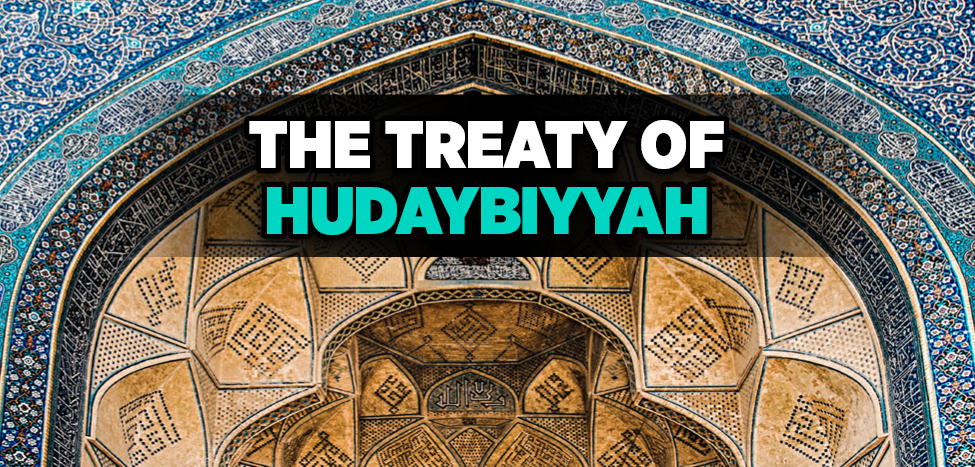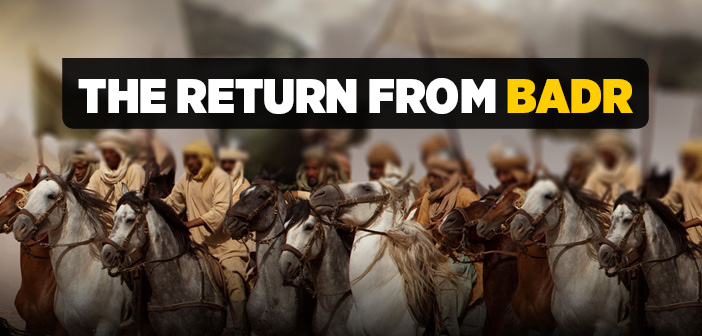What is the treaty of hudaybiyyah? What is hudaybiyyah agreement?
In line with a dream he saw, the Blessed Prophet -upon him blessings and peace- invited the Believers to a journey to Kaabah for pilgrimage.[1] With a total of one-thousand-four-hundred[2] Companions who heeded the invitation, the Noble Messenger -upon him blessings and peace- set out for Mecca, on the first Monday of Dhilqadah, on the sixth year of Hegira. As they were not going for battle, they only armed themselves with swords for self-protection. They also had around seventy camels for sacrifice.[3]
Omar -Allah be well-pleased with him- asked the Prophet of Allah -upon him blessings and peace- whether he was not concerned over a possible attack by Abu Sufyan and his men, suggesting therefore it might be better for them to carry more weapons than they had intended.
“I am not so sure”, replied the Blessed Prophet -upon him blessings and peace-. “I would not want to be armed when having intended for umrah.” (Waqidi, II, 573)
Upon reaching the miqat border of Dhulhulayfah, the Blessed Prophet -upon him blessings and peace- wore an ihram and made an intention to perform umrah. The Companions followed. They began shouting talbiyah aloud, reflecting their burning desire to unite with Kaabah as soon as possible. The spiritual excitement and rapture was taking the Believers closer to their destination at each step.
But an inexpressible anxiety took hold of the idolaters of Quraysh the moment they were informed of the approaching Muslims. In an emergency meeting, they decided not to allow Muslims passage no matter at what cost. A swiftly mobilized unit of two-hundred men under the commands of Khalid ibn Walid and Iqrimah departed Mecca to meet the Believers.
The Blessed Prophet -upon him blessings and peace- and the Believers had by now reached Sariyyah, from where it was quite easy to descend into Mecca. But Qaswa, the camel on which the Blessed Prophet -upon him blessings and peace- was astride, crouched there and then. All efforts by the Companions to get her moving proved fruitless. They began commenting that the camel had come to a halt.
“She has not come to a halt; nor does she have a habit of the kind”, stated the Messenger of Allah -upon him blessings and peace- . “She has only been stopped by He who has prevented her from entering Mecca!”
He then added, “By He, in whose Hand of Might my life resides, no matter how demanding the conditions Quraysh lay down, in the name of esteeming what Allah has prohibited in His Sanctuary, are, I will surely accept them!”
He then signaled for the camel to move; she virtually soared. The Blessed Prophet -upon him blessings and peace- then changed his direction away from Quraysh and descended near an almost dessicate well. This was the furthermost distant point of Hudaybiya from Mecca. The well was all but without water; the meager amount of water it had quickly dried up. The Companions complained to the Blessed Prophet -upon him blessings and peace- over the lack of water. The Prophet -upon him blessings and peace- took an arrow out of his bag and told them to thrust it into the base of the well. Before long, with the will of the Almighty, the well began sprouting with water, continuing to flow generously up until the Companions decided to leave.
In the meantime, Budayl, the leader of the Huzaa Tribe, arrived with a few men. He spoke of the Meccan anxiety and their preparations for war. Despite the seeming apprehension of Quraysh, the Blessed Prophet -upon him blessings and peace- explained Budayl the reason underlying their visit in the following:
“We have not come to fight with anyone. Our purpose is to visit the House of Allah; to perform umrah. War has taken its toll on Quraysh…it has worn them out and caused much damage. Should they desire, we could make a treaty for a certain amount of time. That way they will step away from between me and others. Should I triumph over others, then, if Quraysh wishes, she may also enter the Islam that others enter. Should I fail, then Quraysh will have a breather. Should they desist from accepting this offer, then by Allah, I will fight for the sake of this Religion until my head is severed from my body. Surely, Allah will fulfill His promise.”
Budayl returned to Mecca and conveyed the words of the Prophet of Allah -upon him blessings and peace- to Quraysh, hearing which Urwa ibn Masud got up and stated, “The man is showing you the path of goodness. Accept his offer and send me to him to make a treaty!”
The notables of Quraysh agreed to send him. The Noble Prophet -upon him blessings and peace- said similar words to Urwa. Throughout, with the corner of his eye, Urwa was inspecting the Companions while the Prophet of Allah -upon him blessings and peace- spoke. When he returned, he animatedly recounted to the idolaters what he saw:
“Listen carefully to me, my fellow people. I swear to you that as an ambassador I have been in the presence of many kings in the past. I have stood facing the Khosrau, the Cesar and the Negus. But never have I seen anything like the devotion and respect the Muslims have for Muhammad! When he wants something, they all run to get it. If he takes wudu, they compete with each other for his water. When he speaks, they all go silent. Out of their respect for him, they lower their gazes and do not look inquisitively at his face, even for a moment. When a strand of hair falls from his head, they quickly take hold of it as keepsake. The man is making a sensible offer. Accept it!”[4]
After Urwah finished what he had to say, another man from the Kinanah tribe asked permission to go to the Noble Messenger, too. So he was sent. The Blessed Prophet -upon him blessings and peace- , upon seeing him, said, “Here comes a man from a tribe that appreciates camels spared for sacrifice for hajj and umrah. Release your sacrificial camels towards him so he can see!”
The man could not help but say, “It does not seem right to hinder them from visiting Kaabah!” (Bukhari, Shurut, 15; Ahmad, IV, 323-324)
Regardless of what the men told them, Quraysh deployed a cavalry unit to launch a raid against the Believers. Although the assailing idolaters were eventually taken prisoner by the Muslims, they were released by the Noble Messenger who wanted to make loud and clear his intention of having come only to offer umrah, not to shed blood.[5]
The Prophet’s -upon him blessings and peace- tent was set at Hudaybiya, outside the Haram borders. Still, throughout his stay there, the Blessed Prophet -upon him blessings and peace- would go within the Haram borders to offer his salats.[6]After all, a salat offered in the vicinity of Kaabah is of greater worth than a hundred thousand others offered anywhere else.[7]
[1] Waqidi, II, 572.[2] Ibn Saad, II, 95. With the joining of Beduoin Arabs on the way, their number is believed to have risen to one-thousand five-hundred, even to one-thousand seven-hundred according to another source.[3] Ibn Saad, II, 95.[4] Thomas Carlyle feels obliged to confess this truth when he says, “No emperor fashioning a crown on his head has ever received the respect Muhammad received, a man who wore a mantel he patched with his own hands.”[5] Muslim, Jihad, 132, 133.[6] Waqidi, II, 614; Ahmad, IV, 326.[7] See, Ibn Majah, Iqamah, 195.
Source: Osman Nuri Topbaş, The Prophet Muhammed Mustafa the Elect II, Erkam Publications





